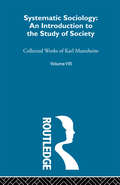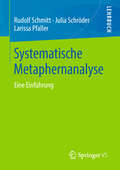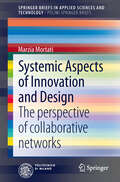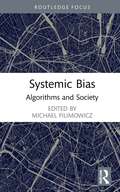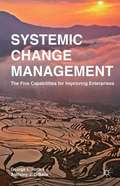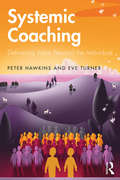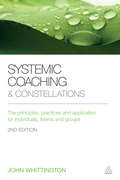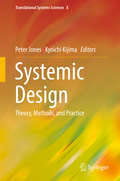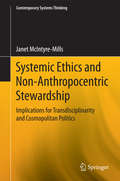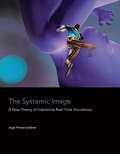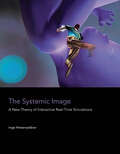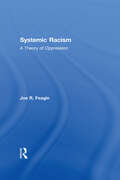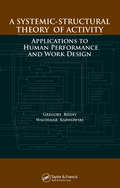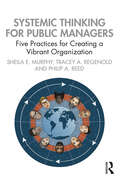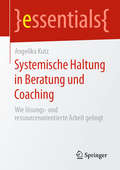- Table View
- List View
Systematic Sociology V 8: An Introduction To The Study Of Society (International Library Of Sociology And Social Reconstruction)
by Karl MannheimFirst published in 1957. Routledge is an imprint of Taylor & Francis, an informa company.
Systematische Metaphernanalyse: Eine Einführung
by Rudolf Schmitt Julia Schröder Larissa PfallerDie Analyse von Metaphern hat sich als neuer Weg zu den Deutungen entwickelt, in denen Menschen sich und ihre Welt begreifen. Dieses Lehrbuch führt in den am weitesten entwickelten Metaphernbegriff der kognitiven Linguistik ein und skizziert eine Methode für verlässliche Rekonstruktion der metaphorischen Konstruktionen von Selbst und Welt.
Systemic Aspects of Innovation and Design
by Marzia MortatiThe book provides a snapshot of a hot topic - the systemic nature of innovation and its relevance to design - with a trifold perspective: the academic level - the literature on innovation studies and design is often neglected and a clear connection between the two topics taken for granted; the research level - collaborative models are currently considered great opportunities for transforming consumption, production and distribution of goods, but a clear scholarly discourse is still forming; the political level - the European Commission and the OECD are devoting much effort to understanding and measuring the impact of design in innovation processes and firms and a clear contribution would greatly support this path. Thus the book provides an informed, historical and nuanced perspective to the relationship between design and innovation to contribute to all three levels and to propose a point of view that goes beyond aesthetics and meanings.
Systemic Attitude in Consulting and Coaching: How Solution- and Resource-orientated Work Succeeds (essentials)
by Angelika KutzIn this Springer essentials it is shown that the action portfolio of systemics offers a wonderful basis to support clients - or a client system - in the best possible way to initiate and shape change processes (change) and to work out suitable solutions for the client system. The systemic attitude can also be learned, is a healing companion in all life situations and represents a continuous maturing process.
Systemic Bias: Algorithms and Society (Algorithms and Society)
by Michael FilimowiczSystemic Bias: Algorithms and Society looks at issues of computational bias in the contexts of cultural works, metaphors of magic and mathematics in tech culture, and workplace psychometrics. The output of computational models is directly tied not only to their inputs but to the relationships and assumptions embedded in their model design, many of which are of a social and cultural, rather than physical and mathematical, nature. How do human biases make their way into these data models, and what new strategies have been proposed to overcome bias in computed products? Scholars and students from many backgrounds, as well as policy makers, journalists, and the general reading public will find a multidisciplinary approach to inquiry into algorithmic bias encompassing research from Communication, Art, and New Media.
Systemic Change Management
by George L. Roth Anthony J. DibellaAchieving and sustaining great business performance requires more than ongoing internal improvements; it demands a capacity to promote changes across organizations that depend on one another. Through a series of cases, Systemic Change Management describes a systems approach to enterprise change. Organizations are more successful individually and collectively when they develop and diffuse five enterprise change capabilities - promoting enterprise awareness, installing innovation sets, balancing push and pull changes, seeking growth, and distributing leadership. Each capability enhances individual firm performance and when used together create a synergy that magnifies their overall effectiveness and impact. This book explains how a system of change capabilities can be developed and demonstrates their use at a variety of organizations, including United Technologies, Rockwell Collins, Raytheon, Toyota, Ariens, the US Army, and US Air Force. The reader will come to understand that performance improvement requires internal change along with collaboration with suppliers and other organizations to effectively function as an enterprise.
Systemic Change Through Praxis and Inquiry
by Arne CollenThis new volume in the distinguished Praxiology series examines the confluence of praxiology, pragmatics, and systemics in the study of systemic change through human inquiry, particularly small group activities, human organizations, and globalizing trends. It covers core concepts indigenous to organizational life. The author presents and subsequently integrates several conceptual schemes relevant to human beings and small groups engaged in human inquiry for systemic change in organizational settings.Each key concept in the volume is covered in a chapter theme that articulates the praxiology and pragmatics of human inquiry. Chapter 1 examines change as a systemic idea from a research methodologist's point of view. Chapter 2 articulates numerous points to distinguish systemic from non-systemic research methods to bring about systemic change. Chapter 3 discusses the prevalence of hierarchy and control. Chapter 4 focuses on "disciplinarity," viewed as one kind of quest for understanding complexity and change. Chapter 5 describes praxiology in inquiry. Chapter 6 elaborates on emergent forms of praxiology. Chapter 7 demonstrates the viability of systemic change through praxiology. Chapter 8 targets the general features of research process that are the means to effectuate systemic change, while Chapter 9 elaborates on these means toward developing systemic inquiry to systemic change. Chapter 10 discusses "complexification" in human inquiry and systemic change.Systemic Change Through Praxis and Inquiry is a pioneering effort to attain a more integrated view of research methodology for human inquiry. It will be of great interest to students of business, management, and organizational studies.Arne Collen is a long-standing member of both the Executive Faculty at Saybrook Graduate School in San Francisco and the Research and Teaching Adjunct Faculty in the California College of Organizational Studies and the California College of Professional Psychology of Alliant International University, San Francisco Bay Campus. He is a research methodologist, who, over the last three decades, has applied systemic and sociocybernetic perspectives to advances in research methodology for human inquiry. With Wojciech W. Gasparski, he is co-editor of Design and Systems, Volume 3 of the Praxiology series.
Systemic Coaching: Delivering Value Beyond the Individual
by Peter Hawkins Eve TurnerHawkins and Turner argue that coaching needs to step up to deliver value to all the stakeholders of the coachee, including those they lead, colleagues, investors, customers, partners, their local community and also the wider ecology. Systemic Coaching contains key chapters on how to contract in various settings, how to work relationally and dialogically, how to expand our own and others’ ecological awareness, how to get greater value from supervision, work with systemic ethics and expand our impact. While illustating why a new model of coaching is necessary, Hawkins and Turner also provide the tools and approaches that coaches and clients need to deliver this greater impact, accompanied by real-life case examples and interviews from the authors and other leading coaches and leaders globally. Systemic Coaching will be an invaluable resource for coaches in practice and in training, mentors, coach supervisors, consultants in leadership development and HR and L&D professionals and leaders.
Systemic Coaching and Constellations
by John WhittingtonSystemic Coaching and Constellations offers a refreshingly uncomplicated path into a potentially complex subject, demonstrating how this approach can provide access to systems and deliver enduring benefits for coaching clients. This new edition offers a comprehensive introduction to the principles that sustain systems, real world descriptions of what systemic coaching is and how it can be useful as well as a step-by-step guide to integrating the principles and practices into coaching. Highly practical, Systemic Coaching and Constellations includes a wide range of exercises for application with individuals and teams. It also includes a brand new chapter on Belonging, fully updated case studies from coaches who have taken part in John's trainings, a joint ICF/EMCC constellation workshop and examples from coaches around the world, including Australia, Mexico, France, Spain, US and the Netherlands. Whether used in an initial selection meeting or to underpin all your coaching conversations and interventions, Systemic Coaching and Constellations offers an accessible, practical starting point to transform your coaching practice.
Systemic Cognition and Education: Empowering Students for Excellence in Life
by Ibrahim A. HallounThis book offers pedagogic and governance foundations and guidelines for systemic education. It provides an overall systems-based picture of what formal education should be about, and of how things should be carried out in practice, in order to empower students – and teachers – for success in life. It transcends traditional disciplinary education, showing how systemic, praxis immersive, convergence education (SPICE) produces graduates who know how to think outside the box and excel in practical real-life situations. Drawing on philosophy, cognition, and the latest developments in neuroscience, the book calls for systemic pedagogical frameworks that allow for different curricula to be coherently and efficiently designed, and consistently and systematically deployed across different disciplines and various grade levels in the context of mind-and-brain based experiential learning ecologies.This volume is a major design and practice reference for school teachers, university professors, graduate students, along with interested educators, educationists, and stakeholders in various sectors of society.
Systemic Design: Theory, Methods, and Practice (Translational Systems Sciences #8)
by Peter Jones Kyoichi KijimaThis book presents emerging work in the co-evolving fields of design-led systemics, referred to as systemic design to distinguish it from the engineering and hard science epistemologies of system design or systems engineering. There are significant societal forces and organizational demands impelling the requirement for “better means of change” through integrated design practices of systems and services. Here we call on advanced design to lead programs of strategic scale and higher complexity (e.g., social policy, healthcare, education, urbanization) while adapting systems thinking methods, creatively pushing the boundaries beyond the popular modes of systems dynamics and soft systems. Systemic design is distinguished by its scale, social complexity and integration – it is concerned with higher-order systems that that entail multiple subsystems. By integrating systems thinking and its methods, systemic design brings human-centred design to complex, multi-stakeholder service systems. As designers engage with ever more complex problem areas, it is necessary to draw on a basis other than individual creativity and contemporary “design thinking” methods. Systems theories can co-evolve with a new school of design theory to resolve informed action on today’s highly resilient complex problems and can deal effectively with demanding, contested and high-stakes challenges.
Systemic Ethics and Non-Anthropocentric Stewardship
by Janet Mcintyre-MillsThis book makes a case for rights and responsibilities to be expressed through a cosmopolitan praxis based on developing strong cosmopolitan approaches. This developed approach respects a form of cultural or national identity that is not at the expense of others, the environment or future generations. This new stoicism is based on a sense of responsibility for others. The book also explores systemic ethical praxis in response to the vexed challenge of how to bridge the false dualism of pitting the environment versus profit Systemic Ethics and Non-Anthropocentric Stewardship: Implications for Transdisciplinarity and Cosmopolitan Politics is organized into seven chapters. The book begins by providing readers with an understanding of the way in which cosmopolitanism (like all social concepts) is shaped by diverse definitions and applied differently by theorists and those that engage in transformative praxis. It also develops an argument based on considering the empirical consequences of social, economic and environmental decisions on the quality of life of current and future generations. The next chapter critiques anthropocentricism and explores how policy makers develop agreements on what constitutes and supports the wellbeing of the planet rather than the GDP. The book then explores the options for social democracy and ways to enhance an ethical approach to post national governance and argues for participatory democracy and governance to respond to diversity within and across national boundaries. The following chapters reflect upon the author's own participatory action research process and examines the transformations that can arise through critical systemic thinking and practice. Next the book makes the case for systemic ethical governance that is able to manage consumption, before concluding with a final look at the book's approach, based on critical heuristics.
Systemic Functional Political Discourse Analysis: A Text-based Study (Routledge Studies in Linguistics)
by Eden Sum-hung Li Percy Luen-tim Lui Andy Ka-chun FungSystemic Functional Political Discourse Analysis: A Text-based Study is the first book which takes a comprehensive systemic functional perspective on political discourse to provide a complete, integrated, exhaustive, systemic and functional description and analysis. Based on the political discourses of the Umbrella Movement – the largest public protest in the history of Hong Kong, which occupies a unique political situation in the world: a post-colonial society like many other Asian societies and yet unlike the others, it is a Special Administrative Region of China. Though it enjoys a high degree of autonomy under the principle of ‘One Country, Two Systems’, it is still confined to being part of the ‘One Country’. The book demonstrates how a systemic functional approach can provide a comprehensive, thorough, and insightful analysis of the political discourse from four co-related and complementary approaches: contextual, discourse semantic, lexicogrammatical and historical. Apart from a thorough discussion of various systemic functional conceptions, it provides examples of various analyses from a SF perspective, including contextual parameters, registerial analysis, semantic discourse analysis, appraisal analysis, and discusses important issues in political discourse, including negotiation of self-identity, association of language, power and institutional role, and expression of ‘evidentiality’ and ‘subjectivity’. It is written not only for those who are interested in Hong Kong politics in general and political discourse in Hong Kong in particular, but also for those who work on political discourse analysis, and those who apply SFL to various other discourses such as mass media discourse, medical discourse, teaching discourse, etc. Last but not least, this book is also intended to provide a theoretical framework in discourse analysis from the systemic functional perspective for those who work in Cantonese and in other languages.
The Systemic Image: A New Theory of Interactive Real-Time Simulations
by Inge HinterwaldnerComputer simulations conceive objects and situations dynamically, in their changes and progressions. In The Systemic Image, Inge Hinterwaldner considers not only the technical components of dynamic computer simulations but also the sensory aspects of the realization. Examining the optic, the acoustic, the tactile, and the sensorimotor impressions that interactive real-time simulations provide, she finds that iconicity plays a dominant yet unexpected role. Based on this, and close readings of a series of example works, Hinterwaldner offers a new conceptualization of the relationship between systemic configuration and the iconic aspects in these calculated complexes.Hinterwaldner discusses specifications of sensorialization, necessary to make the simulation dynamic perceivable. Interweaving iconicity with simulation, she explores the expressive possibilities that can be achieved under the condition of continuously calculated explicit changes. She distinguishes among four levels of forming: the systems perspective, as a process and schema that establishes the most general framework of simulations; the mathematical model, which marks off the boundaries of the simulation's actualization; the iconization and its orientation toward the user; and interaction design, necessary for the full unfolding of the simulation. The user makes manifest what is initially latent. Viewing the simulation as an interface, Hinterwaldner argues that not only does the sensorially designed aspect of the simulation seduce the user but the user also makes an impact on the simulation -- on the dynamic and perhaps on the iconization, although not on the perspectivation. The influence is reciprocal.
The Systemic Image: A New Theory of Interactive Real-Time Simulations (The\mit Press Ser.)
by Inge HinterwaldnerA new conceptualization of the relationship between the systemic and the iconic in real-time simulations that distinguishes among four levels of forming.Computer simulations conceive objects and situations dynamically, in their changes and progressions. In The Systemic Image, Inge Hinterwaldner considers not only the technical components of dynamic computer simulations but also the sensory aspects of the realization. Examining the optic, the acoustic, the tactile, and the sensorimotor impressions that interactive real-time simulations provide, she finds that iconicity plays a dominant yet unexpected role. Based on this, and close readings of a series of example works, Hinterwaldner offers a new conceptualization of the relationship between systemic configuration and the iconic aspects in these calculated complexes.Hinterwaldner discusses specifications of sensorialization, necessary to make the simulation dynamic perceivable. Interweaving iconicity with simulation, she explores the expressive possibilities that can be achieved under the condition of continuously calculated explicit changes. She distinguishes among four levels of forming: the systems perspective, as a process and schema that establishes the most general framework of simulations; the mathematical model, which marks off the boundaries of the simulation's actualization; the iconization and its orientation toward the user; and interaction design, necessary for the full unfolding of the simulation. The user makes manifest what is initially latent. Viewing the simulation as an interface, Hinterwaldner argues that not only does the sensorially designed aspect of the simulation seduce the user but the user also makes an impact on the simulation—on the dynamic and perhaps on the iconization, although not on the perspectivation. The influence is reciprocal.
Systemic Racism: A Theory of Oppression
by Joe FeaginIn this book, Feagin develops a theory of systemic racism to interpret the highly racialized character and development of this society. Exploring the distinctive social worlds that have been created by racial oppression over nearly four centuries and what this has meant for the people of the United States, focusing his analysis on white-on-black oppression. Drawing on the commentaries of black and white Americans in three historical eras; the slavery era, the legal segregation era, and then those of white Americans. Feagin examines how major institutions have been thoroughly pervaded by racial stereotypes, ideas, images, emotions, and practices. He theorizes that this system of racial oppression was not an accident of history, but was created intentionally by white Americans. While significant changes have occurred in this racist system over the centuries, key and fundamentally elements have been reproduced over nearly four centuries, and US institutions today imbed the racialized hierarchy created in the 17th century. Today, as in the past, racial oppression is not just a surface-level feature of society, but rather it pervades, permeates, and interconnects all major social groups, networks, and institutions across society.
Systemic Racism in America: Sociological Theory, Education Inequality, and Social Change
by Rashawn RayRacist policies are identified as "opportunity killers," and the disparities created by them often have racism sustained through race-neutral policies. Systemic Racism in America: Sociological Theory, Education Inequality, and Social Change situates our contemporary moment within a historical framework and works to identify forms, occurrences, and consequences of racism as well as argue for concrete solutions to address it. This volume assembles renowned and thought-provoking social scientists to address the destructive impacts of structural racism and the recent, incendiary incidents that have driven racial injustice and racial inequality to the fore of public discussion and debate. The book is organized into three parts to explore and explain the ways in which racism persists, permeates, and operates within our society. The first part presents theoretical perspectives to analyze the roots and manifestation of contemporary racism; the second concentrates on educational inequality and structural issues within our institutions of learning that have led to stark racial disparities; and the third and final section focuses on solutions to our current state and how people, regardless of their race, can advocate for racial equity. Urgent and needed, Systemic Racism in America is valuable reading for students and scholars in the social sciences, as well as informed readers with an interest in racism and racial inequality and a passion to end it.
Systemic Racism in South Africa: Humanity Lost
by Rupert TaylorThis book takes a critical macro-level political sociological perspective to understanding South African politics and society. Applying systemic racism theory to South Africa, the author argues that South African society through its exclusionary social mechanisms has assumed a systemically racist form that deeply compromises questions of truth and justice. Constitutive of, and embedded in, the structure of South African society, racism has a reach and a durability that runs deep through the successive stages of segregationism, apartheid, and liberal democracy. Showing the limits of the rule of law in a racist society, the author offers a theoretically-informed interpretation as to why the national liberation struggle has fallen short of its promise to deliver a &“better life for all,&” and as to why truth and justice remain so deeply compromised in South Africa today. The arguments advanced are supported by over thirty semi-structured interviews conducted by the author with high-profile South African politicians, jurists, and intellectuals; as well as by using Truth and Reconciliation Commission hearing transcripts – both public and &“top-secret.&” This thought-provoking book is driven by the imperative to offer a compelling and sustained argument for taking a systemic racism approach to interpreting South Africa for scholars and students of sociology, political science, race and ethnic studies, law, and South African history.
Systemic Research in Individual, Couple, and Family Therapy and Counseling (European Family Therapy Association Series)
by Maria Borcsa Jochen Schweitzer Matthias OchsThis book examines systemic family therapy research, addressing key topics across the interrelated disciplines of psychotherapy, social work, and counseling. Drawing from contributions at the 2017 International Systemic Research Conference in Heidelberg, it includes both quantitative and qualitative research perspectives and outlines a wide array of approaches, using systems theory and constructivist epistemology. In addition, the book focuses on innovative paradigms, research strategies, and methods, seeking to bridge the gap between research and practice in the field of systemic family therapy. Finally, it provides guidance on submitting and maximizing the likelihood of research paper acceptance to leading family therapy journals. Topics featured in this book include:Effectiveness of research-informed systemic therapy.Mindfulness and compassion-based interventions in relational contexts.Use of SCORE (Systemic Clinical Outcome and Routine Evaluation) as an indicator of family functioning in Europe.Systemic approaches for working with couples with high conflict behaviors.Therapeutic-Factor-Oriented skill building in systemic counseling.Importance of client feedback in development of professional knowledge base. Systemic Research in Individual, Couple, and Family Therapy and Counseling is a must-have resource for researchers, professors, and graduate students in family therapy, clinical psychology, general practice/family medicine, and social work as well as all interrelated psychology and medical disciplines.
Systemic Structural Constellations and Sustainability in Academia: A New Method for Sustainable Higher Education
by Marlen ArnoldIn order to create truly sustainable universities, we require new methods of visualising and interpreting them holistically as institutions built on complex relationships and systems, rather than as individual departments and people operating independently. This book uses a systemic structural constellations approach to demonstrate how we can build more sustainable higher education institutions, both in terms of teaching and research and at an operational level. Drawing examples from current research and teaching, Systemic Structural Constellations and Sustainability in Academia explores how universities are not only centres of teaching and learning but can also play a crucial role in enabling future decision-makers to appreciate and contribute to a more sustainable future. Providing a clear introduction to systemic structural constellations and guidance on how to practically apply the theory to numerous aspects of the higher education system, this book will be of great interest to students and researchers of education for sustainable development, organisational learning and sustainable management, as well as those tasked with transforming the higher education system for the future.
A Systemic-Structural Theory of Activity: Applications to Human Performance and Work Design
by Gregory Bedny Waldemar KarwowskiWhile its importance is widely recognized, the theoretical basis and practical applications of Activity Theory have not yet been firmly established in the field of human factors and ergonomics, experimental, and work psychology. This book presents the foundations of the systemic-structural theory of human activity. It contains multiple practical examples of systemic-structural theory of activity analyses, including a study of production operations in the manufacturing environment, system safety evaluation, work improvement, equipment design, robot system performance, and design of human/computer interaction tasks in the context of training, efficiency, work motivation, fatigue, personality, and individual style of performance.
Systemic Thinking for Public Managers: Five Practices for Creating a Vibrant Organization
by Sheila Murphy Tracey Regenold Philip ReedOffering a pathway to vibrant organizations, this book integrates systems thinking, critical thinking, and design thinking, and provides the tools needed to proactively apply them in the social systems where we live and work. Systemic thinking—the combination of systems thinking, critical systems thinking, and design thinking—provides a way of addressing the complexity of problems faced by public sector managers. Far too often systemic thinking has been discussed theoretically rather than practically. This book changes that, enabling public sector managers and leaders to connect staff, partners, and stakeholders in the pursuit of thoughtfully designed and responsive service. Clearly written and designed to be put to immediate use on the job, each chapter provides a discussion of one specific practice. Included are guiding principles, a case study, relevant practical tools, and suggestions of for additional practice and reading.Using this book, managers of social systems such as public welfare, healthcare, public schools and libraries, housing and community development, and students of public administration will gain a deeper understanding of organizational systems and design, and a new toolkit to fortify their own organizations.
Systemische Haltung in Beratung und Coaching: Wie lösungs- und ressourcenorientierte Arbeit gelingt (essentials)
by Angelika KutzIn diesem essential wird gezeigt, dass das Handlungsportfolio der Systemik eine wunderbare Grundlage bietet, um Klienten – oder auch ein Klienten-System – bestmöglich dabei zu unterstützen, Veränderungsprozesse (Change) einzuleiten und zu gestalten und für das Klientensystem passende Lösungen zu erarbeiten. Die systemische Haltung ist zudem erlernbar, ein heilsamer Wegbegleiter in allen Lebenslagen und stellt einen kontinuierlichen Reifungsprozess dar.
Systemische Strategiearbeit in Organisationen: Strategiekompetenz für Entscheider und Berater (essentials)
by Volker Köhninger Andrea Mikoleit Thorsten VeithMegatrends und Disruptionen verändern die Organisationswelt radikal und erfordern neue Formen der Unternehmenssteuerung. Neben Strategiekompetenz werden die Verantwortungs- und Entscheidungskultur sowie die Lernfähigkeit von und in Organisationen essentielle Faktoren für zukünftigen Erfolg sein. Systemische Strategiearbeit liefert hierfür Anregungen und Konzepte – zur Gestaltung einer modernen Zukunftsarbeit.
Systemische Strukturaufstellungen in Beratung und Management: Das Implizite Und Unbewusste Wissen Für Entscheidungen Aktivieren
by Marlen Gabriele ArnoldDieses Buch bietet fundierte Einblicke in eine faszinierende neue Methode, mit der Systeme erfasst, abgebildet und erprobt werden können. Inhaltlicher Schwerpunkt sind betriebswirtschaftliche und organisationale Faktoren. Die Autorin beschreibt Entscheidungsherausforderungen in den Bereichen Individuum, Organisation und System. Sie zeigt verschiedene Aufstellungsformate für das systemische Arbeiten im Managementkontext. Neben der theoretischen Aufbereitung werden praktische Beispiele auf allen drei Ebenen (Person, Organisation und System) anschaulich dargestellt und visualisiert. Prägnante Bilder der Aufstellungen unterstützen das Verständnis und veranschaulichen, wo konkrete Nutzungspotenziale liegen.
